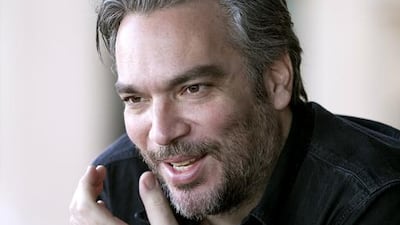Pablo Escobar was the richest criminal in history. At the height of his powers, the Colombian drug lord’s cartel is thought to have controlled 80 per cent of the global cocaine market, earning US$60 million (Dh220.4m) a day by the late 1980s.
In 1992 he was jailed, a year later he escaped and was killed in a gunfight at the aged of 44, having amassed a personal fortune of $30billion.
Escobar's story is prime material for Hollywood, but, amazingly, it has never before been told on the big screen. In 2007 two projects were announced – Joe Carnahan's Killing Pablo and Oliver Stone's Escobar – but they have yet to see the light of day.
Beating both of the big names to the screen, is the first-time director Andrea Di Stefano, an actor, whose Escobar: Paradise Lost began a well-received festival run at the Toronto International Film Festival in September, and finishes with a pair of screenings at Diff ahead of a UAE release on Thursday, December 18.
Making headlines in the title role is Benicio del Toro. No stranger to playing historical figures – he starred as Che Guevara in Che, the two-part 2008 biopic of the Argentine revolutionary – the Puerto Rican actor gives a powerhouse performance as the unhinged criminal mind behind hundreds of deaths. Among those reputedly murdered on Escobar's orders, the death toll among police officers alone is thought to be more than 600.
He bought off the authorities with his infamous “plata o plomo” offer – which translates as “silver or lead”, the choice being taking a bribe or facing death.
“Pablo Escobar was immensely ferocious and violent,” says Di Stefano after Saturday’s Diff gala screening. “He was able to do things that probably no other criminal in history has done.“
Rather than telling Escobar's rags-to-riches story (Escobar was one of nine children and his father was a farmer), Di Stefano, who also wrote the screenplay, sidelines the criminal's biography in favour of Nick, a semi-fictional Canadian surfer who is drawn into the drug dealer's world. Played by the Hunger Games star Josh Hutcherson, Nick falls in love with Escobar's niece Maria, which introduces him to life on Escobar's Graceland-esque ranch, Hacienda Nápoles.
The idea came from “three sentences” the Italian director heard from a police officer about a real-life “young Italian fellow who went to Colombia to meet his brother, somehow became close to the Escobar family, and then got in trouble.”
The movie begins in June 1991, a day before Escobar turned himself over to the authorities, with Nick being asked to perform a favour for the ganglord. The first act then rewinds to show the young couple’s meeting and courtship, while the final act is a tense thriller charting the gangster’s last day before jail.
Those expecting a modern-day Scarface will be surprised. The audience never sees drugs on-screen and the only visually violent acts take place in the final third of the movie.
“I tried to sell a movie without ever showing cocaine, because it wasn’t about cocaine,” says Di Stefano. “It was about his criminal mind.
“In his field, the criminal world, he was some kind of genius. There was something about his evilness – he was good at it. He was a wasted talent.”
It is the kind of movie you might think some people might not want to see made. But the 44-year-old director says there was no interference from the Colombian authorities or the ganglord’s relatives. His decision to shoot entirely in Panama was logistical.
“I didn’t try to ask for the approval of the Escobar family,” says Di Stefano.
After finishing the script five years ago – before acting in the blockbuster films Life of Pi and Nine – Di Stefano couldn't move the project forward without the right cast. He has no hesitation in admitting that Del Toro was the first choice for the lead role. Never having met him, getting the A-lister on board took place through "the normal" channels – a script was sentand then a meeting was set up.
“We talked a lot,” says the director. “He wanted to be reassured about certain things – I had nothing to convince him beside my enthusiasm and my research.”
And there was a lot of research – not to mention passion. Throughout our interview, Di Stefano is brimming with facts and anecdotes about his subject – such as how Escobar once tricked a close friend into acting as a suicide bomber, bringing down a plane and murdering 120 passengers to target a single politician who, as it turned out, was not even on board.
“As a writer, I’m fascinated by Escobar – as an artist and narrator, there’s a psychology that gives me a lot of possibility to play around,” says Di Stefano.
“But that’s completely different to saying I admire him as a human being. When you’re surrounded by kind people and you are evil, it’s very easy to have such achievements.”
• Escobar: Paradise Lost screens at Diff on Wednesday, December 17, at 3pm at Mall of the Emirates 11, and will go on general release on Thursday, December 18
rgarratt@thenational.ae

